人教版(五四制)七年级下英语各单元易混淆词汇及短语辨析
人教版英语七年级下册Unit6 易混淆单词和短语辨析
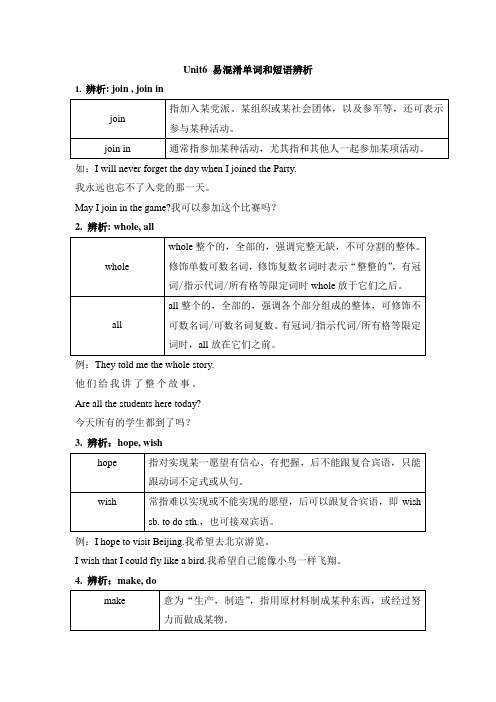
Unit6 易混淆单词和短语辨析1. 辨析: join , join in如:I will never forget the day when I joined the Party.我永远也忘不了入党的那一天。
May I join in the game?我可以参加这个比赛吗?2. 辨析: whole, all例:They told me the whole story.他们给我讲了整个故事。
Are all the students here today?今天所有的学生都到了吗?3. 辨析:hope, wish例:I hope to visit Beijing.我希望去北京游览。
I wish that I could fly like a bird.我希望自己能像小鸟一样飞翔。
4. 辨析:make, do如:I’m doing my homework.我正在做家庭作业。
He’s making a cake.他正在做蛋糕。
5.辨析:race, game如:He’s the youngest swimming in the race.他是比赛中最年轻的游泳选手。
Do you like to watch NBA games on TV? 喜欢看电视上的美国NBA篮球赛吗?6.辨析:study, learn如:He’s now studying in the United States. 他现在正在美国学习。
The baby is learning to speak.这个婴儿正在学说话。
7.辨析:look, see, watch, read如:Please look at the blackboard.请看黑板。
You should see a doctor when you are ill.当你生病时应该去看医生。
Do you watch TV every day?你每天都看电视吗?Mr. Li likes reading newspapers.李先生喜欢看报纸。
人教版英语七年级下册Unit6 易混淆单词和短语辨析

Unit6 易混淆单词和短语辨析1. 辨析: join , join in如:I will never forget the day when I joined the Party.我永远也忘不了入党的那一天。
May I join in the game?我可以参加这个比赛吗?2. 辨析: whole, all例:They told me the whole story.他们给我讲了整个故事。
Are all the students here today?今天所有的学生都到了吗?3. 辨析:hope, wish例:I hope to visit Beijing.我希望去北京游览。
I wish that I could fly like a bird.我希望自己能像小鸟一样飞翔。
4. 辨析:make, do如:I’m doing my homework.我正在做家庭作业。
He’s making a cake.他正在做蛋糕。
5.辨析:race, game如:He’s the youngest swimming in the race.他是比赛中最年轻的游泳选手。
Do you like to watch NBA games on TV? 喜欢看电视上的美国NBA篮球赛吗?6.辨析:study, learn如:He’s now studying in the United States. 他现在正在美国学习。
The baby is learning to speak.这个婴儿正在学说话。
7.辨析:look, see, watch, read如:Please look at the blackboard.请看黑板。
You should see a doctor when you are ill.当你生病时应该去看医生。
Do you watch TV every day?你每天都看电视吗?Mr. Li likes reading newspapers.李先生喜欢看报纸。
人教版七年级英语下全册语法、重点、短语、句型、释疑
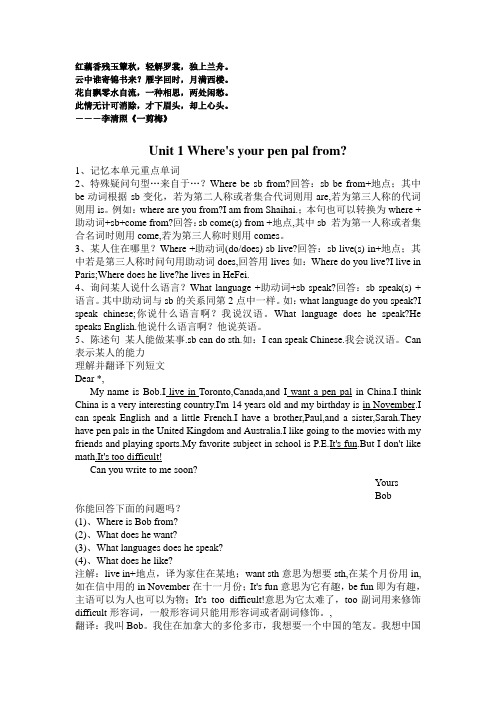
红藕香残玉簟秋,轻解罗裳,独上兰舟。
云中谁寄锦书来?雁字回时,月满西楼。
花自飘零水自流,一种相思,两处闲愁。
此情无计可消除,才下眉头,却上心头。
---李清照《一剪梅》Unit 1 Where's your pen pal from?1、记忆本单元重点单词2、特殊疑问句型…来自于…?Where be sb from?回答:sb be from+地点;其中be动词根据sb变化,若为第二人称或者集合代词则用are,若为第三人称的代词则用is。
例如:where are you from?I am from Shaihai.;本句也可以转换为where +助动词+sb+come from?回答:sb come(s) from +地点,其中sb 若为第一人称或者集合名词时则用come,若为第三人称时则用comes。
3、某人住在哪里?Where +助动词(do/does) sb live?回答:sb live(s) in+地点;其中若是第三人称时问句用助动词does,回答用lives如:Where do you live?I live in Paris;Where does he live?he lives in HeFei.4、询问某人说什么语言?What language +助动词+sb speak?回答:sb speak(s) +语言。
其中助动词与sb的关系同第2点中一样。
如:what language do you speak?I speak chinese;你说什么语言啊?我说汉语。
What language does he speak?He speaks English.他说什么语言啊?他说英语。
5、陈述句某人能做某事.sb can do sth.如:I can speak Chinese.我会说汉语。
Can 表示某人的能力理解并翻译下列短文Dear *,My name is Bob.I live in Toronto,Canada,and I want a pen pal in China.I think China is a very interesting country.I'm 14 years old and my birthday is in November.I can speak English and a little French.I have a brother,Paul,and a sister,Sarah.They have pen pals in the United Kingdom and Australia.I like going to the movies with my friends and playing sports.My favorite subject in school is P.E.It's fun.But I don't like math.It's too difficult!Can you write to me soon?YoursBob你能回答下面的问题吗?(1)、Where is Bob from?(2)、What does he want?(3)、What languages does he speak?(4)、What does he like?注解:live in+地点,译为家住在某地;want sth意思为想要sth,在某个月份用in,如在信中用的in November在十一月份;It's fun意思为它有趣,be fun即为有趣,主语可以为人也可以为物;It's too difficult!意思为它太难了,too副词用来修饰difficult形容词,一般形容词只能用形容词或者副词修饰。
人教版英语七年级下册Unit4 易混淆单词和短语辨析
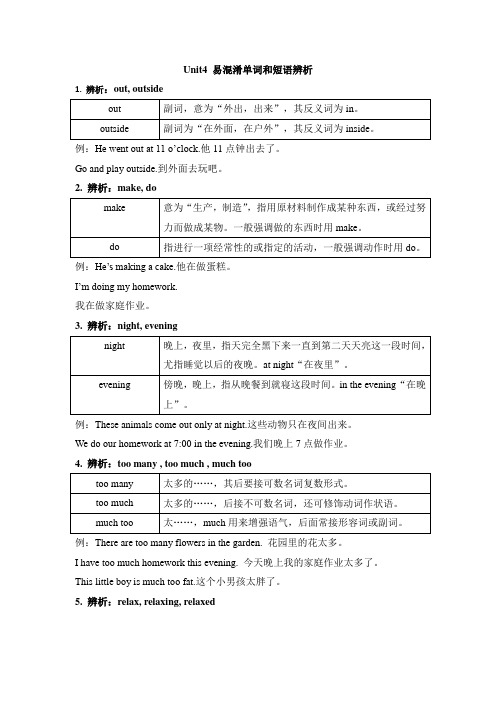
Unit4 易混淆单词和短语辨析1. 辨析:out, outside例:He went out at 11 o’clock.他11点钟出去了。
Go and play outside.到外面去玩吧。
2. 辨析:make, do例:He’s making a ca ke.他在做蛋糕。
I’m doing my homework.我在做家庭作业。
3. 辨析:night, evening例:These animals come out only at night.这些动物只在夜间出来。
We do our homework at 7:00 in the evening.我们晚上7点做作业。
4. 辨析:too many , too much , much too例:There are too many flowers in the garden. 花园里的花太多。
I have too much homework this evening. 今天晚上我的家庭作业太多了。
This little boy is much too fat.这个小男孩太胖了。
5. 辨析:relax, relaxing, relaxed如:Playing games always relaxes me.玩游戏总是使我放松:This film is very relaxing.这部电影令人很放松。
He is relaxed after listening to music.听完音乐后,他感到轻松。
6. 辨析:either, too, also如:Yesterday I didn’t watch TV and I didn’t see the film, either. 昨天我没有看电视,也没有看电影。
I play football after school, too. = I also play football after school. 放学后我也踢足球。
人教版七年级英语下册Unit1-3词语辨析
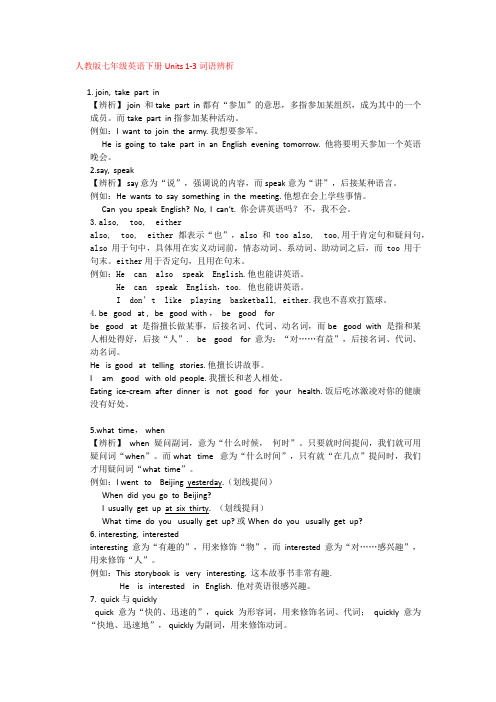
人教版七年级英语下册Units 1-3词语辨析1. join, take part in【辨析】 join 和 take part in 都有“参加”的意思,多指参加某组织,成为其中的一个成员。
而take part in 指参加某种活动。
例如:I want to join the army. 我想要参军。
He is going to take part in an English evening tomorrow. 他将要明天参加一个英语晚会。
2.say, speak【辨析】 say 意为“说”,强调说的内容,而speak意为“讲”,后接某种语言。
例如:He wants to say something in the meeting. 他想在会上学些事情。
Can you speak English? No, I can’t. 你会讲英语吗?不,我不会。
3.also, too, eitheralso, too, either都表示“也”,also 和 too also, too,用于肯定句和疑问句,also用于句中,具体用在实义动词前,情态动词、系动词、助动词之后,而too用于句末。
either用于否定句,且用在句末。
例如:He can also speak English.他也能讲英语。
He can speak English,too. 他也能讲英语。
I don’t like playing basketball, either.我也不喜欢打篮球。
4.be good at , be good with , be good forbe good at 是指擅长做某事,后接名词、代词、动名词,而be good with 是指和某人相处得好,后接“人”. be good for 意为:“对……有益”,后接名词、代词、动名词。
He is good at telling stories. 他擅长讲故事。
I am good with old people. 我擅长和老人相处。
英语人教版七年级下各单元知识点和语法
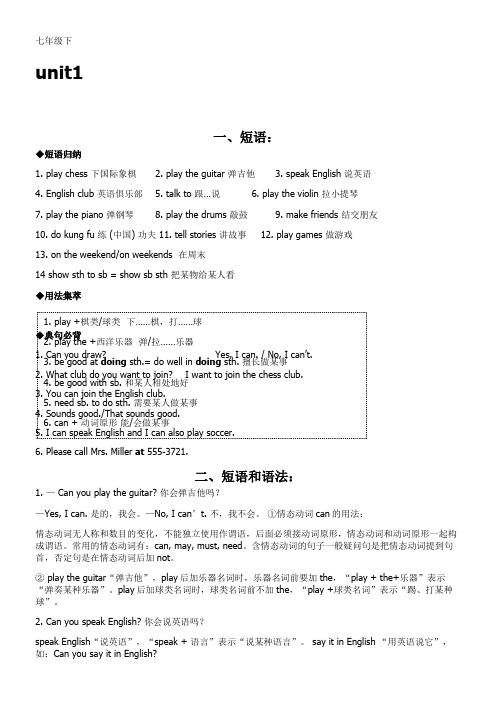
七年级下unit1一、短语:◆短语归纳1. play chess 下国际象棋2. play the guitar 弹吉他3. speak English 说英语4. English club 英语俱乐部5. talk to 跟…说6. play the violin 拉小提琴7. play the piano 弹钢琴 8. play the drums 敲鼓 9. make friends 结交朋友10. do kung fu 练 (中国) 功夫 11. tell stories 讲故事 12. play games 做游戏13. on the weekend/on weekends 在周末14 show sth to sb = show sb sth 把某物给某人看◆用法集萃 ◆典句必背 1. Can you draw? Yes, I can. / No, I can’t. 2. What club do you want to join? I want to join the chess club. 3. You can join the English club. 4. Sounds good./That sounds good. 5. I can speak English and I can also play soccer.6. Please call Mrs. Miller at 555-3721.二、短语和语法:1. — Can you play the guitar? 你会弹吉他吗?—Yes, I can. 是的,我会。
—No, I can ’t. 不,我不会。
①情态动词can 的用法:情态动词无人称和数目的变化,不能独立使用作谓语,后面必须接动词原形,情态动词和动词原形一起构成谓语。
常用的情态动词有:can, may, must, need 。
含情态动词的句子一般疑问句是把情态动词提到句首,否定句是在情态动词后加not 。
人教版7年级下英语各单元易混淆疑问词和短语辩析
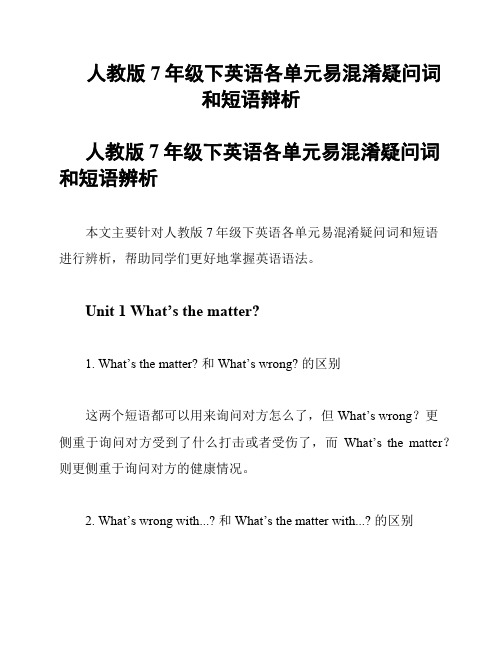
人教版7年级下英语各单元易混淆疑问词和短语辩析人教版7年级下英语各单元易混淆疑问词和短语辨析本文主要针对人教版7年级下英语各单元易混淆疑问词和短语进行辨析,帮助同学们更好地掌握英语语法。
Unit 1 What’s the matter?1. What’s the matter? 和What’s wrong? 的区别这两个短语都可以用来询问对方怎么了,但What’s wrong?更侧重于询问对方受到了什么打击或者受伤了,而What’s the matter?则更侧重于询问对方的健康情况。
2. What’s wrong with...? 和What’s the matter with...? 的区别这两个短语都可以用来询问对方某件事物出了什么问题,但What’s wrong with...?更偏向于询问事物本身有什么问题,而What’s the matter with...?则更偏向于询问为什么会出现这样的问题。
1. by bike 和 on a bike 的区别by bike 意为“骑自行车”,是一种交通方式,而 on a bike 则表示“骑着自行车”,强调动作或状态。
2. take 与 ride 的区别take 表示“乘坐(非动力交通工具)”,而 ride 则表示“骑(动力交通工具)”。
Unit 3 Language in use1. What do you think?和 How do you think?的区别这两个短语都可以用来询问对方的想法,但What do you think?更普通,可以用在各种场合,而 How do you think?更多地用于询问对方是否赞成自己的想法。
2. How many 与 How much 的区别How many 用来询问可数名词的数量,而 How much 用来询问不可数名词的数量。
Unit 4 I have a pen pal1. in front of 和 at the front of 的区别in front of 表示在某人或某物前面,介词 in 表示在一个相对比较宽的范围内;而 at the front of 意为“在前排最前面”,强调位置。
人教版英语七年级下册Unit9 易混淆单词和短语辨析

Unit9 易混淆单词和短语辨析1.辨析:tall, high如:My father is very tall. 我的父亲个子很高。
They climbed high. 他们爬得很高。
2.辨析:remember to do sth, remember doing sth如:Remember to turn off the light when you leave the room.当你离开房间的时候记得关灯。
I remember turning off the light when I left the room.我记得离开房间时关灯了。
3.辨析:real, true, truth如:Let’s give him some real English food to eat.让我们给他一些正宗的英国食品吃。
It is true that she married that doctor.她嫁给了那个医生,这是真的。
He cannot hide the truth.他不能掩盖真相。
4.辨析:talk about, talk to/with, talk of例:The students are talking about the picture.学生们正在谈论那幅画。
My English teacher is talking to/with my father .我的英语教师正在和我父亲谈话。
He often talks of his school life.他常常谈起他的学校生活。
5.辨析:each, every如:Each student has his own dictionary.每个学生都有一本自己的字典。
He takes exercises every day.他每天都锻炼。
6.辨析:may be, maybe如:He may be a teacher.他也许是个教师。
Maybe he is a teacher.也许他是个教师。
- 1、下载文档前请自行甄别文档内容的完整性,平台不提供额外的编辑、内容补充、找答案等附加服务。
- 2、"仅部分预览"的文档,不可在线预览部分如存在完整性等问题,可反馈申请退款(可完整预览的文档不适用该条件!)。
- 3、如文档侵犯您的权益,请联系客服反馈,我们会尽快为您处理(人工客服工作时间:9:00-18:30)。
人教版(五四制)七年级下英语各单元易混淆单词和短语辨析Unit1 易混淆词汇及短语辨析1、anyone,any oneanyone 只能指人,后面不接of短语。
any one既可指人,也可指物,表示“(某些人或物中的)任何一个”,后面可接of短语。
例:Anyone in our town knows him. 坑我们镇上任何一个人都认识他。
You can read any one of the books here. 你可以读这里的任何一本书。
2、something,anything,nothingsomething复合不定代词,意为“某事;某物”,常用于肯定句中。
其用于疑问句中时,表示希望得到对方的肯定回答。
例:I know something about her. 我知道一点儿关于她的事。
anything复合不定代词,一般用于疑问句或否定句中,其不同如下:疑问句中指“某事物”。
否定句中指“任何事物都(没有)”。
肯定句中指“任何事物;无论任何事”。
nothing 复合不定代词,意为“没有什么;没有一件东西”,其作主语时,谓语动词用单数形式。
例:There is nothing new in today’s newspaper. 今天的报纸上没有什么新鲜事。
3、everyone,every oneeveryone复合不定代词,意为“每人;人人;所有人”,相当于everybody,作主语时,谓语动词用单数形式。
every one是两个词,既可指人,也可指物,后面可跟介词of。
例:Everyone in our class likes Mr. Liu. 我们班的每个人都喜欢刘老师。
Everyone is here, and every one of us has a chance to speak at the meeting. 大家都到了,我们每个人都有机会在会上发言。
4、problem, questionproblem 指需要研究、解决的问题或难题,常与动词solve连用。
question 指有疑问,需要回答的问题,常与ask与answer等连用。
例:We are trying to solve the problem. 我们正在试图解决这个问题。
Please answer my question seriously. 请认真回答我的问题。
5、arrive at,arrive inarrive 动词,意为“到达”。
arrive at 后面接较小的场所,如镇、家、店等。
arrive in 后面接较大的地方,如国家、大城市等。
【真题链接】Connie arrived ____ the village ____ a snowy night. (广东)A. at; onB. at; inC. in; atD. in; on【解析】:A。
从句子结构我们一眼可以看出本题考查的是表达“到达某个地方”时arrive与介词的搭配和表达具体的某天的上午、下午或晚上时的介词搭配。
因为村庄是小地方,且“arrive at+小地方”、“arrive in+大地方”,故应用arrive at;在具体的某天的上午、下午或晚上,用介词on。
6、too many,too much,much tootoo many “太多”,用来修饰可数名词复数。
too much “太多”,用来修饰不可数名词。
much too “极其;非常;太“,相当于副词very,常用来修饰形容词或副词。
【用法歌诀】too much, much too去掉前词看后头;much可接不可数(n.),too则修饰形(adj.)或副(adv.)7、because of,becausebecause of介词短语,后常跟名词、代词或V-ing形式,可置于句首或句末。
because 后常接表示原因的从句,语气较强,可回答why引导的特殊疑问句,不可与so连用。
My grandpa was in hospital because of his illness.(=My grandpa was in hospital because he was ill.)因为生病,我爷爷住院了。
【真题链接】He had to retire(退休)early _____ poor health.(江苏扬州)A. as a resultB. becauseC. soD. because of解析:D。
所选项引导原因且后跟名词,而as a result“结果”,连接分句:because“因为”,后接句子;so“因此”,作连词或副词,其后不跟名词。
故排除选项A、B和C。
because of后可跟名词、代词或V-ing形式,故选D。
8、bring,takebring “拿来”,指把东西从远处拿到近处来。
take “拿走”,指把东西从近处往远处拿。
【真题链接】If the postman has a registered(挂号)letter for us, he _____ it to our flat.(山东威海)A. bringsB. spendC. leavesD. take 【解析】A。
be为第三人称单数,故排除选项B和D。
由“to our flat”可知,是把挂号信带到我们的公寓,即“说话者所在的地点”,故用bring“带来”。
9、no one,noneno one(1) 能指人,一般单独使用,不能与of连用。
(2) 作主语时,谓语动词用单数形式。
(3) 一般用来回答who 开头的文句。
none(1) 既可指人,也可指物。
(2) 可单独使用,也可与of连用,后跟不可数名词或可数名词复数。
(3) none of与不可数名词连用作主语时,谓语动词用单数形式。
(4) none of与可数名词复数连用作主语时,谓语动词用单、复数形式均可。
(5) 一般用来回答how many或how much开头的问句。
—Who is in the room? 谁在房间里?No one. 没人。
How many boys are there in the room? 房间里有多少个男孩?None. 一个也没有。
10、find out,find,look forfind out着重表示通过理解、分析、思考、询问等“弄淸楚;查明”某个情况、亊实等。
find 意为“找到;发现”,强调“找”的结果,其宾语往往是某个丢失的人或物。
look for意为“寻找”,是有目的地“找” 强调“找”这一动作。
Go and find out when the train will leave. 去査一下火车什么时候开。
I found my shoes under the bed.我在床下找到了我的鞋。
—What are you looking for? 你在找什么?—I’m looking for my books.我在找我的书。
【真题链接】—Jack, could you help me when the plane will take off on the Internet?—I’m sorry, my computer doesn't work.(山东泰安)A. get outB. look outC. take out D . find out 【解析】D。
作答本题时可用语义推理法。
本题考查动词短语。
对于四个动词短语的选择,应从语义入手,句意:“杰克,你能帮我在网上查一下飞机什么时候起飞吗?”“对不起,我的电脑坏了。
”由此推出答案为find out“发现;查明;弄清”,故选D。
get out“出去”;look out“提取;除去”。
Unit2 易混淆单词和短语辨析例:We all laughed loudly when she made a joke.她开了一个玩笑,我们都大声笑了。
He smiled to see the children so happy.看到孩子们这么幸福,他笑了。
如:He won a prize yesterday.他昨天得了一个奖。
We weren’t sure we could beat them.我们没有把握能打败他们。
例:He talks to me like my father. 他像父亲那样跟我谈话。
(他不是我父亲)He talks to me as a father. 他以父亲的身份跟我谈话。
(他是我父亲)3如:We studied in this school about two years ago.我们大约两年前在这所学校学习。
They came here before this week.他们是在这个星期前来这儿的。
如:Please call me soon.请尽快给我发电话。
He quickly got up and went on running.他迅速起来,继续跑。
He runs fast.他跑得快。
5、辨析: true, real, really例:The news is true.这消息是真的。
Most of what he says is true.他说的话大部分是真实的。
It’s not a toy gun; it’s the real thing.它不是一把玩具枪,而是一把真枪。
I’m not really interested in fishing.我不是真的对钓鱼感兴趣。
6、辨析: news, information, message例:I have some good news for you.我有好消息告诉你。
There is much information in this book.这本书里有许多资料。
I’m sorry, she’s out right now. Can I take a message?对不起,她这儿会出去了。
要我传个话吗?如:I don’t like this book; please give me another one.我不喜欢这本书;请给我另外一本。
I have two pens; one is red, the other is blue.我有两支钢笔;一支是红的,另一支是蓝的。
There are fifty students in our class, of which twenty are from the countryside and the others are from the city.我们班有50个学生,其中20个来自农村,其余的都来自城市。
He is my friend, who is always ready to help others.他是我的朋友,一个总是乐于助人的人。
